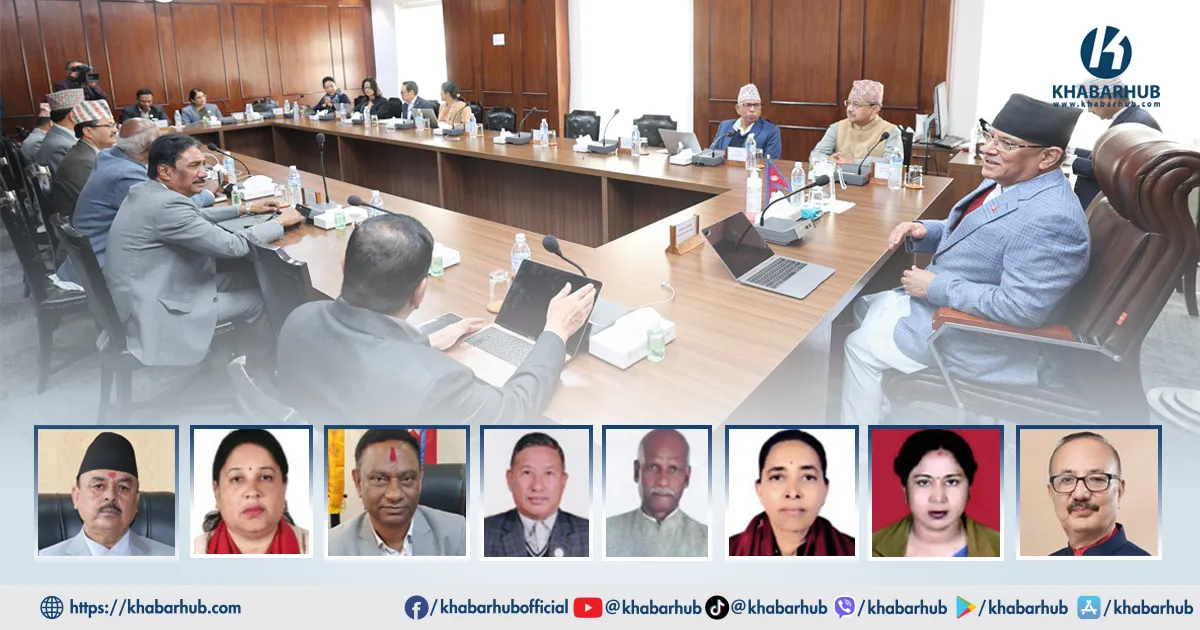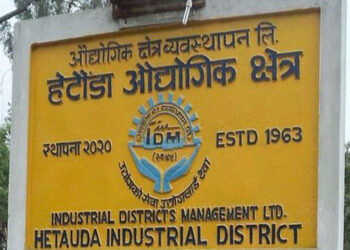KATHMANDU: Are you familiar with the name of the current Minister for Women, Children, and Senior Citizens? What about the Ministers of General Administration, Forests, Industry, or Youth and Sports?
If these names don’t ring a bell, you’re in good company. Or if you are drawing a blank, you’re not alone!
In the Prime Minister Pushpa Kamal Dahal Prachanda-led government, some ministers have been noticeably absent from the public eye for a year.
Disappearing within the Singha Durbar, these ministers have failed to make a lasting impact on the public consciousness.
Despite regular visits to their ministries, these ministers, entrusted with responsibilities, have failed to engage with the public or make a visible difference in their roles.
Urban Development Minister Sita Gurung manages to attract attention by visiting the new parliament building and the under-construction minister’s residence.
Occasionally, they make appearances in their home districts as guests in small events or embark on foreign trips.
However, for the most part, they remain out of the limelight, with little discussion among citizens about any noteworthy achievements.
In an attempt to showcase their activities, some ministers resort to delegating the task of emailing the media about their general activities and meetings.
Photos with ministers posted on social media as ‘poses with the minister’ serve as a minor spotlight, although the substance of their work remains questionable.
While some ministers manage to grab headlines, it is often due to controversy rather than accomplishments.
Take Sudan Kirati, the Minister of Culture, Tourism, and Civil Aviation, whose uncontrolled speeches have garnered attention, overshadowing any meaningful work.
The dire issue of cooperative victims in the country goes unnoticed by Land Management Cooperatives and Poverty Alleviation Minister Ranjana Shrestha.
Despite her lack of focus on cooperative problems, she gains attention by speaking out strongly on behalf of her husband, Resham Chaudhary, rather than for her ministry work.
Forest and Environment Minister Birendra Mahato remains unheard, whether he is in the ministry or abroad. With no notable work to his name, Mahato remains anonymous.
However, challenges such as ongoing gold smuggling at the airport and failure to apprehend cooperative thugs have limited his impact, making his name more prominent than his actual contributions.
Sitting in the Minister of Women, Children, and Senior Citizens chair, Surendra Raj Acharya complains to his relatives about working in a ministry he does not want to be a part of, despite any efforts to come into the limelight.
Urban Development Minister Sita Gurung manages to attract attention by visiting the new parliament building and the under-construction minister’s residence.
On the other hand, Youth and Sports Minister Dig Bahadur Limbu struggles to make his identity known, failing to come into the limelight.
In the past year, common people could not discern the ministries overseen by the three state ministers – Sushila Sirpali, Nanda Chapai, and Pramila Kumari.
Their appointments appear to serve the sole purpose of contributing to the coalition, meeting the constitutional quota of 25 ministers, and burdening the state treasury.
Industry Minister, Ramesh Rizal: Previously seen in the foreground during Prime Minister Dahal’s visit to India and later offering water at Pashupatinath, Minister Rizal has since faded from the public eye amid the ongoing dispute between the government and industrialists over the dedicated line.
With industrialists complaining about economic recession, Minister Rizal’s presence and actions remain elusive.
Ministry of General Administration, Anita Devi: Taking charge of the ministry, Anita Devi’s political affiliation is unclear to many.
While the Federal Civil Code is in abeyance and staff problems persist at the state and local levels, Minister Anita Singh seems to have disappeared inside the Singha Durbar.
Energy Minister, Shakti Bahadur Basnet: Formerly a Maoist leader, now the Energy Minister, Basnet has maintained a low profile this year, failing to undertake actions that would bring him into the limelight.
Health Minister, Mohan Bahadur Basnet: Despite occasional statements in the media, Minister Basnet is accused of focusing solely on his constituency, Sindhupalchowk, and is more renowned for his name than his work.
Reports have even emerged that he cut off facilities at Bir Hospital.
Labor Minister, Sarat Singh Bhandari: Initially in the news for his speeches, Minister Bhandari has become less active, with little movement in his portfolio.
Drinking Water Minister, Mahindra Rai Yadav: Remains unheard of, with no notable presence or actions in the public domain.
Finance Minister, Dr. Prakash Sharan Mahat: Known for consistently delivering the same speech about the improving economy, Finance Minister Mahat has not displayed diverse actions or initiatives.
Education Minister Ashok Rai: Previously in the limelight during the teachers’ movement, Minister Rai has failed to advance the Education Act and undertake work that would attract attention.
Criticism from his party, Janata Samajwadi Party, suggests that the government’s work is ineffective.
Communication and Information Technology Minister, Rekha Sharma: As the government’s spokesperson, Minister Sharma naturally receives attention, but the ministry she oversees is in disarray, with issues such as the Ncell case, security printing, satellite purchase, and Teramox purchase going unresolved.
Home Minister, Narayankaji Shrestha: As the Deputy Prime Minister, Shrestha was expected to be in the limelight due to the nature of his ministry.
However, challenges such as ongoing gold smuggling at the airport and failure to apprehend cooperative thugs have limited his impact, making his name more prominent than his actual contributions.
Deputy Prime Minister, Purna Bahadur Khadka: Avoiding media interactions, Deputy Prime Minister Khadka’s effectiveness in handling the defense ministry’s responsibilities remains questionable, especially in situations like the withdrawal of peacekeeping forces from African countries and the Chief of Army Staff’s complaint about tree-cutting delays.
Foreign Affairs Minister NP Saud: Despite media coverage, Minister Saud’s inability to take initiatives to free kidnapped Nepalis by Hamas and bring back those recruited into the Russian army is seen as a diplomatic weakness for Nepal.
The success of the foreign minister is measured by Nepal’s international image and diplomatic skills.
Law Minister, Dhanraj Gurung: Going abroad is deemed acceptable for Law Minister Gurung, considering the challenging task of legislation.
Agriculture Minister, Beduram Bhusal: Regarded as a cooperative leader, Minister Bhusal spent the year seemingly inactive at Singha Durbar.
Assessment of Ministerial Performance in Government
The effectiveness of Prakash Jwala, the Minister of Physical Infrastructure, comes into scrutiny based on the capital spent on development work.
Shakti Bahadur Basnet, Minister of Energy, Water Resources, and Irrigation: Minister Basnet asserts the production of 500 megawatts of electricity within a year, with plans for immediate production of additional capacity.
Currently, contractors face delayed payments, and development expenditure remains low, impacting the economy negatively.
Jwala’s tenure is marked by challenges in keeping the economy running and addressing the issues faced by contractors.
As PM Pushpa Kamal Dahal continues to lead the government, his years seem to have passed in delivering speeches at various events.
However, his promises of facilitating people’s work and ensuring good governance have largely remained slogans without significant implementation over the past year.
In response to the Prime Minister’s announcement of firing non-performing ministers, questions arise about who will take this step, considering the government’s limited pool of 25 ministers, many of whom are perceived as not contributing significantly.
Ultimately, the Prime Minister bears the highest responsibility for the government’s efficacy.
Ministerial Responses:
Prakash Jwala, Minister of Physical Infrastructure and Transport: Minister Jwala acknowledges policy complications and issues with the Public Procurement Act but claims to have made remarkable progress despite these challenges.
He highlights efforts to revitalize projects and terminate unproductive contracts.
Jwala emphasizes advancements in road construction, especially in Darchula and Humla, connecting Humla district to the national road network.
Additionally, he mentions the resolution of the fast bus service from Ratnapark to Suryabinayak.
Shakti Bahadur Basnet, Minister of Energy, Water Resources, and Irrigation: Minister Basnet asserts the production of 500 megawatts of electricity within a year, with plans for immediate production of additional capacity.
He mentions progress in solving transmission line issues and operationalizing some transmission lines as achievements.
Minister of Women, Children, and Senior Citizens, Surendraraj Acharya, responds to criticism by stating that his ministry’s work may not be immediately perceived as developmental.
Basnet outlines a 100 percent electrification plan in the distribution system within the next year and a half, with 98 percent coverage already achieved.
He also mentions advancements in irrigation projects, targeting 4 lakh hectares of land.
While both ministers present their achievements, the broader question remains about the overall impact of the government’s actions in addressing the economic challenges and fulfilling promises made to the public.
The effectiveness of the government’s initiatives, especially in critical sectors like infrastructure and energy, will determine its success in meeting the expectations of the people.
Ministerial Self-Assessment: A Year in Review
Federal Affairs and General Administration Minister Anita Devi asserts her accomplishments, emphasizing policy initiatives and comprehensive work within the ministry.
She claims to have addressed numerous issues, with the Prime Minister reportedly expressing satisfaction.
Minister Anita highlights her focus on empowering local levels, claiming to resolve many problems at the grassroots level.
Minister of Women, Children, and Senior Citizens, Surendraraj Acharya, responds to criticism by stating that his ministry’s work may not be immediately perceived as developmental.
He cites passing the stalled children’s policy, adding nine correctional homes, and initiating rehabilitation centers in Lumbini and Sudurpaschim Provinces as notable achievements.
Acharya acknowledges challenges, such as the removal of the women’s development branch in every district, but claims efforts are underway to address these issues.
Youth and Sports Minister Dig Bahadur Limbu differentiates his ministry, emphasizing its technical nature with a focus on improving the sports sector.
Former Secretary Shrestha provides a critical perspective on the current government, expressing the view that it has not effectively executed the amount of work it should have undertaken.
He acknowledges budget constraints and challenges in distributing awards to players but underscores progress in sports infrastructure protection and promotion across provinces.
Limbu claims to have initiated staff adjustments and highlights discussions on national pride projects for stadiums in various locations.
Land Management, Cooperatives, and Poverty Alleviation Minister Ranjita Shrestha highlights her work on crucial policies related to land management and cooperatives.
She claims active efforts to address cooperative problems and promises to complete ministry work without controversy.
However, detailed information is not provided as she is currently in Nuwakot.
Former Secretary Rabindranath Shrestha, with extensive experience across various government departments, offers a seasoned perspective on the PM Dahal government’s anniversary.
However, his insights or comments are not explicitly detailed in this passage.
As the ministers present their achievements, it remains crucial to evaluate the tangible impact of their work on the ground and the extent to which these actions address the pressing issues faced by the public.
Former Secretary Shrestha provides a critical perspective on the current government, expressing the view that it has not effectively executed the amount of work it should have undertaken.
He attributes this perceived inefficiency to the diverse composition of the government, comprising multiple parties, suggesting that the ministers have not been able to accomplish significant tasks.
In a conversation with Khabarhub, Shrestha states, “The reasons behind the lack of progress need to be thoroughly examined.”
He emphasizes the need for the government to act with honesty and transparency, acknowledging that while he desires to showcase the government’s work positively, his experience indicates a lack of effectiveness in their efforts.
This candid assessment highlights the challenges faced by the government in delivering meaningful and impactful results, potentially stemming from political complexities and other operational obstacles.









Comment